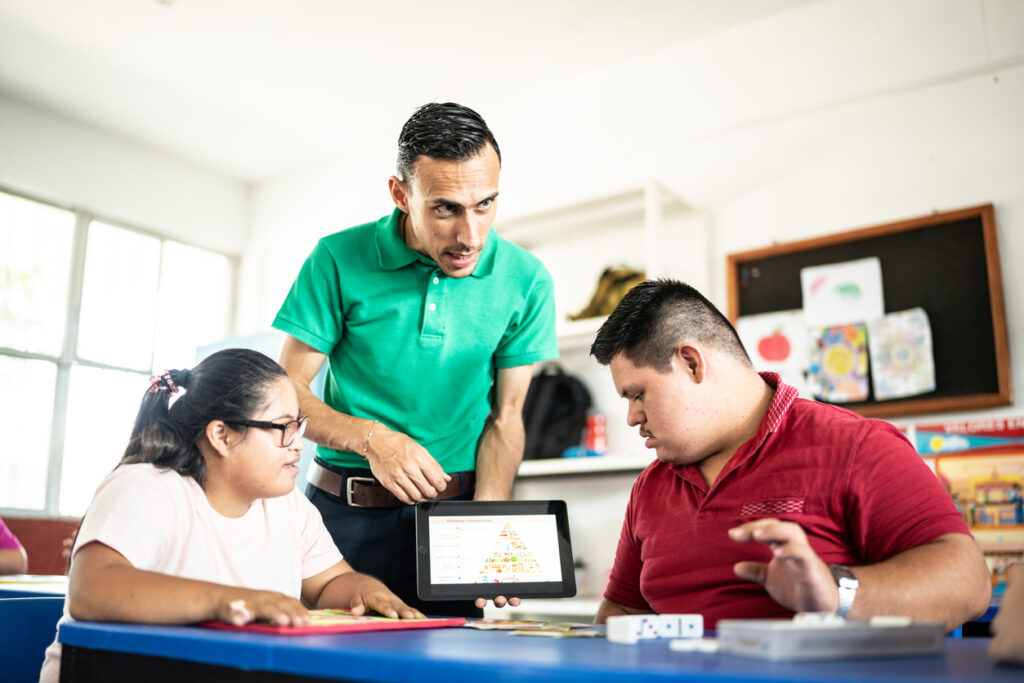
Special Education Teacher With ABA Focus

Applied Behavior Analysis (ABA) is a transformative force in today’s educational landscape. It provides a range of special strategies designed to meet different learning needs, making it an important tool in modern education. The integration of ABA into educational settings is particularly important when it comes to creating customized learning experiences. It’s this aspect of ABA that empowers special education teachers, providing them with the tools they need to truly make a difference. Educators specializing in ABA are well-equipped to positively impact students who require special attention, making sure each child’s education is as rewarding and effective as possible.
What Is an ABA Degree?
An ABA degree, or a degree in Applied Behavior Analysis, offers a thorough look into a blend of theoretical knowledge and practical application. These programs are comprehensive, often extending over several years. They normally require some background in psychology or education as a prerequisite.
Students who pursue an ABA degree develop a robust understanding of behavioral analysis. The knowledge they gain isn’t just theoretical. They learn how to apply these principles effectively in real-world educational settings.
What sets an ABA degree apart from traditional education degrees is its focus. It delves specifically into behavioral modification and intervention strategies to offer a more specialized and concentrated area of study. This special focus gives students a unique set of skills specifically for dealing with certain educational challenges.
The Role of a Special Education Teacher With an ABA Focus

Male teacher explains a lesson about the food pyramid to two students, both of whom have Down Syndrome
Special education teachers specializing in ABA are so important in the educational landscape. Their expertise lies in creating and executing educational programs specifically designed for students with unique learning needs. Every day, these dedicated professionals develop personalized education plans. Their focus extends beyond academics and includes devising strategies for behavioral intervention, constantly tailored to each student’s progress and needs.
But their job isn’t solitary. These teachers are part of a larger team, collaborating closely with other educators, parents, and caregivers. This teamwork is so important, as it forms a supportive network for each student. By working together, they ensure all parts of the student’s education are covered, creating a complete and helpful learning experience. This role requires more than just knowledge of education and behavior. It also requires a strong dedication to helping and caring for each student’s individual needs.
Why ABA Focus in Special Education Is Essential


Educational institutions should recognize and support the role of ABA in special education.
There’s an increasing acknowledgment in the educational community about how effective ABA techniques are in tackling various challenges that arise in special education. This recognition is supported by solid evidence, showing real, measurable benefits in the classroom. Students with special needs who are taught using ABA techniques receive an enhanced learning experience.
Jessica, a 12-year-old with global developmental delays and limited communication abilities, experienced remarkable improvement through an ABA program. With a comprehensive approach involving school and home-based services, Jessica’s tailored ABA programs focused on enhancing her requesting, labeling, and receptive language skills. Over six months, she mastered 47 program targets, significantly advancing in areas like language and math.
That’s just one of countless stories from special education settings where ABA has made a significant difference. These are transformative changes that have a lasting effect on students’ lives. These stories truly underscore the importance of ABA in special education, demonstrating its potential to go beyond educating to genuinely enrich the lives of students.
Skills and Qualities Needed
- Empathy and Patience: These are cornerstone qualities for addressing the unique challenges faced by students.
- Analytical and Problem-solving Skills: Essential for creating effective learning strategies and interventions.
- Communication and Teamwork: Working with a range of individuals, from students to educators, requires strong communication skills.
- Adaptability: Flexibility to cater to a wide array of student needs is key.
- Data Analysis Expertise: Being adept at collecting and interpreting educational data to inform strategies and interventions.
- Creativity and Innovation: The ability to develop engaging and effective teaching methods that capture interest and facilitate the learning of students with diverse needs.
- Resilience and Emotional Stability: Dealing with challenging situations requires patience and resilience to handle emotional ups and downs.
- Cultural Competency: Understanding and respecting the diverse cultural backgrounds of students and their families can greatly enhance communication and learning experiences.
- Ethical and Legal Knowledge: Awareness of legal and ethical considerations in special education, including students’ rights and privacy concerns, is crucial.
Career Prospects and Growth With an ABA Degree
The career prospects and growth opportunities for special education teachers with ABA expertise are both promising and diverse. Currently, there’s a notable market demand for these professionals. The demand is the result of an increased recognition of the importance of specialized educational approaches in meeting the diverse needs of students. These roles usually offer good salaries and benefits because of the specialized skills required.
The field also offers a variety of avenues for professional development. Educators in this area have opportunities to pursue further certifications, step into supervisory positions, or engage in research within the field. These opportunities for growth not only help advance careers but also play a part in shaping the field of special education and ABA, making it an exciting and fulfilling career.


Students with special needs who are taught using ABA techniques receive an enhanced learning experience
Challenges in the Profession
Special education teachers focusing on ABA face several challenges in their profession.
- Behavioral challenges: One of the primary challenges is managing a range of behaviors in the classroom. These behaviors can vary widely, and addressing them effectively requires a great deal of skill and patience.
- Staying current: Another challenge is staying current with the evolving field of ABA. It’s essential for educators to be up-to-date with the latest research and methodologies, but this can be a demanding task given the rapid pace of developments in the field.
- Balancing dynamics: Educators must find a delicate balance between giving individual attention to students and managing the overall dynamics of the classroom. This balance is important for creating a learning environment that benefits all students.
- Family engagement: Engaging with families and addressing their concerns is another key aspect of the job. This requires not only strong communication skills but also sensitivity and understanding, as families are an important part of the educational journey of students with special needs.
Embracing the Journey: The Transformative Role of ABA in Special Education
The role of a special education teacher with an ABA focus goes beyond traditional teaching boundaries. It’s about shaping the lives and futures of students. These educators have the unique privilege and responsibility of making a substantial difference in the lives of students who most need their expertise and care.
There’s a growing need for educational institutions to recognize and support the role of ABA in special education. By doing so, they contribute to the growth of this valuable field. More than a career path, it’s a journey of impact and transformation. Special education teachers in ABA are change-makers at the forefront of educational evolution. For those passionate about making a difference, this career is rewarding and vital to our diverse educational landscape.
To explore more about this impactful career and how you can be a part of this transformative journey, visit AppliedBehaviorAnalysisEdu.org. Here, you can find resources, insights, and guidance to start or advance your career in this dynamic field.


